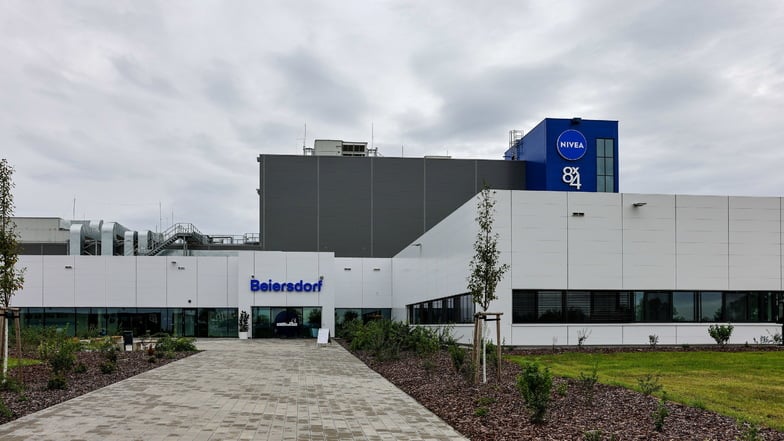By Sven Heitkamp
Leipzig. At just before 3 p.m., a forklift truck rolls a pallet into the warehouse of the new plant of Beiersdorf in Leipzig and places them in the middle of the people celebrating the opening there. The boxes on the pallet contain a special edition of the deodorant that was the first to roll off the production line in the new factory. It says: "Grand Opening. BML Team Leipzig. Together. Growing." The guests are allowed to help themselves to the deodorant bottles - as a memento of the day.
With the symbolic delivery, the Hamburg cosmetics giant officially opened its new plant in Leipzig-Seehausen, north of the exhibition center, on Friday afternoon. However, it is already in operation: production already started in February and has been ramped up since May. Construction work on the factory had started at the beginning of 2021 and was completed after around two years. According to the Group, it has invested almost 300 million euros in a new production center in Leipzig. It is one of the largest in the entire Group network, says Beiersdorf CEO Vincent Warnery.
Own logistics hub planned
In addition, a logistics hub will be built on a neighboring site by 2027 at a cost of around 200 million euros. In the future, up to 400 additional employees will work there, announces project director Tobias Rhensius. It will then be operated by a logistics service provider. Together, the two projects represent the Group's largest single investment in a single site worldwide to date. "We are looking forward to writing a success story in Leipzig," says Warnery. Word on the street is that further investments are planned. Expansion areas already exist.
For the time being, around 200 employees work in three shifts at the plant, producing up to 450 million cosmetic products a year. These are mainly deodorants, hair sprays and shaving foams of the brands Nivea, 8×4 and Hidrofugal for the European market and further export. The first three production lines are currently running, with two more to follow by the end of the year. In total, there may even be up to seven production lines. "Saxony is a good place for investment," emphasized Prime Minister Michael Kretschmer (CDU). The establishment of Beiersdorf will strengthen the industrial location.
However, the start in Leipzig also marks the end of an important cosmetics history in Waldheim near Döbeln. In 1852, the pharmacist Adolf Heinrich August Bergmann opened a perfumery and toilet soap factory there - one of the first in Germany at the time. In 1920, the traditional Florena brand was created in Waldheim, which is still produced today. In 2002, the former Florena Cosmetic GmbH was bought by Beiersdorf. Production will now finally come to an end by the end of September.
Beiersdorf has already sold the property to an investor who wants to develop a regional business park there. The machines are currently going to other locations in the Beiersdorf Group, for example in Berlin, Poland and Spain, says plant manager Stephan Roelen. The site is expected to be vacated after the turn of the year.
Leipzig's OB speaks of 1,000 employees
Many of the colleagues now commute from Waldheim to Leipzig. About half of the 250 employees have transferred with them. Around 50 retired or took retirement, and quite a few received severance pay. For the city of Leipzig, however, the settlement of the cosmetics company is an enrichment.
"We are pleased to get a new industry in Leipzig," says Mayor Burkhard Jung (SPD). He adds that this will make the city more resilient to crises. Jung had already said during the groundbreaking ceremony that his vision was for the group to have 1,000 employees and a research and development department in Leipzig in 20 to 25 years. "We are very happy that they are here." At the same time, he recalled that Leipzig had already been a stronghold of the perfume industry in the 19th century. Back then, the companies were called Karl Heine AG and Schimmel und Co. At the time, Jung said, lavender and rose fields flourished around Leipzig for perfumes.
There is no longer any talk of this at Beiersdorf today. But the new plant will be powered exclusively by renewable energies and biogas and is considered to be almost CO2-neutral. There are also plans to turn the factory into an energy-plus site. By generating its own electricity, for example with photovoltaic systems, more energy will be generated than consumed in the future. In addition, the production center will be able to recover and recycle heat, wastewater and ethanol.








